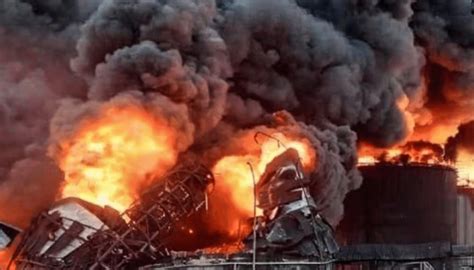
A massive fire erupted at an oil depot in Russia’s Bryansk region on Wednesday after what authorities reported as a drone strike. The blaze, impacting facilities near the settlement of Palytsa, has prompted emergency response efforts and heightened security measures in the area, according to regional officials.
Bryansk region Governor Alexander Bogomaz stated via Telegram that the attack was carried out by a drone, causing a fire at one of the oil depot’s facilities. Emergency services are currently on-site battling the blaze. While initial reports did not specify the extent of the damage or the source of the drone, the incident underscores the continued vulnerability of Russian infrastructure amid the ongoing conflict in Ukraine. No casualties have been reported.
The Bryansk region, which borders Ukraine, has witnessed increased security incidents since Russia’s full-scale invasion began in February 2022. Cross-border shelling, sabotage attempts, and drone attacks have become increasingly common, raising concerns about the spillover of the conflict into Russian territory. The incident also serves as a reminder of the strategic importance of oil depots and other energy infrastructure in the region, making them potential targets in the escalating tensions.
The oil depot reportedly belongs to Transneft, a Russian state-owned pipeline company responsible for transporting oil. Transneft has not yet released any statement regarding the fire. The lack of immediate information from Transneft raises questions about the potential scale of the damage and its impact on oil distribution networks.
Local residents reported seeing a large plume of black smoke rising from the depot and hearing explosions. The incident highlights the growing concerns among Russian citizens living near the border with Ukraine about their safety and the potential for further attacks.
The Ukrainian government has not officially claimed responsibility for the drone strike. However, Ukrainian officials have previously stated that attacks on Russian infrastructure are legitimate targets as part of their defense against Russian aggression. The ambiguity surrounding responsibility for the attack reflects the complex and often deniable nature of cross-border operations during the conflict.
This incident is the latest in a series of similar attacks targeting Russian oil and gas infrastructure in recent months. These attacks have raised concerns about the resilience of Russia’s energy sector and its ability to sustain its war effort. The continued targeting of these facilities could have significant implications for Russia’s economy and its capacity to supply fuel to its military.
Analysis of the Incident
The drone strike on the Bryansk oil depot represents a significant escalation in the ongoing conflict between Russia and Ukraine. While neither side has officially acknowledged responsibility, the incident underscores the growing vulnerability of Russian infrastructure to attack. This vulnerability has several important implications:
- Strategic Significance: Oil depots are crucial components of Russia’s energy infrastructure, providing fuel for both civilian and military purposes. Disrupting these facilities can significantly impact Russia’s ability to sustain its war effort and fuel its economy.
- Psychological Impact: Attacks on Russian territory have a significant psychological impact on the Russian population, raising questions about the government’s ability to protect its citizens. This can erode public support for the war and increase pressure on the government to de-escalate the conflict.
- Escalation Risk: Each attack on Russian territory increases the risk of further escalation, potentially leading to a wider conflict. Russia may feel compelled to retaliate against Ukraine or its allies, further destabilizing the region.
- Economic Implications: Damage to oil depots and other energy infrastructure can have significant economic implications for Russia, reducing its ability to export oil and gas and increasing domestic fuel prices. This can weaken the Russian economy and make it more difficult for the country to finance its war effort.
- Air Defense Challenges: The attack also highlights the challenges that Russia faces in defending its vast territory against drone attacks. Drones are relatively cheap and easy to acquire, making them a difficult threat to counter.
Background on Bryansk Region
The Bryansk region is a strategically important area for Russia due to its proximity to Ukraine. It shares a long border with Ukraine and serves as a key transit point for military supplies and equipment heading to the front lines. The region has also been used as a staging area for Russian troops and equipment.
Since the start of the war in Ukraine, the Bryansk region has experienced a number of security incidents, including cross-border shelling, sabotage attempts, and drone attacks. These incidents have raised concerns about the potential for the conflict to spill over into Russian territory and have led to increased security measures in the region. The attacks also serve to highlight the porous nature of the border between Russia and Ukraine.
The Role of Drones in the Conflict
Drones have played a significant role in the conflict between Russia and Ukraine. Both sides have used drones for reconnaissance, surveillance, and attack purposes. Drones are relatively cheap and easy to operate, making them a valuable tool for both sides.
Ukraine has been particularly effective in using drones to target Russian military equipment and infrastructure. Ukrainian drones have been used to attack tanks, armored vehicles, artillery positions, and supply depots. These attacks have inflicted significant damage on Russian forces and have helped to slow down the Russian advance.
Russia has also used drones extensively in the conflict. Russian drones have been used to target Ukrainian military positions, civilian infrastructure, and energy facilities. These attacks have caused significant damage and casualties.
The use of drones in the conflict has raised concerns about the potential for escalation. Drones can be used to attack targets deep inside enemy territory, potentially leading to a wider conflict. The lack of clear rules of engagement for drone warfare also raises concerns about the potential for civilian casualties.
Transneft’s Role
Transneft, the owner of the oil depot targeted in the drone strike, is a key player in Russia’s energy sector. The company operates a vast network of pipelines that transport oil across Russia and to other countries. Transneft’s pipelines are crucial for supplying oil to both domestic and international markets.
Any disruption to Transneft’s operations can have significant implications for Russia’s economy and its ability to export oil. The attack on the Bryansk oil depot is likely to disrupt the flow of oil through the region and could lead to higher fuel prices.
Transneft has been a target of previous attacks and sabotage attempts. In 2014, a pipeline operated by Transneft was damaged in an explosion. The Ukrainian government denied responsibility for the attack, but Russian officials blamed Ukrainian saboteurs.
International Reaction
The international community has largely condemned the attacks on Russian territory. The United States and other Western countries have called on Russia to de-escalate the conflict and withdraw its troops from Ukraine. However, Western countries have also avoided directly blaming Ukraine for the attacks on Russian territory, fearing that doing so could further escalate the conflict.
The United Nations has called for an end to the violence and has urged both sides to engage in peace talks. However, there is little hope of a breakthrough in the near future.
Long-Term Implications
The drone strike on the Bryansk oil depot is a sign of the growing intensity of the conflict between Russia and Ukraine. The attacks on Russian territory are likely to continue and could escalate in the future. The long-term implications of the conflict are difficult to predict, but it is clear that the war will have a profound impact on the region for years to come.
The conflict has already led to a humanitarian crisis in Ukraine, with millions of people displaced from their homes. The war has also caused significant damage to the Ukrainian economy and infrastructure.
The conflict has also had a negative impact on the Russian economy. Sanctions imposed by Western countries have limited Russia’s access to international markets and have made it more difficult for the country to finance its war effort.
The conflict has also raised concerns about the potential for a wider war. The United States and other Western countries have provided military aid to Ukraine, which has angered Russia. Russia has warned that it will take retaliatory measures if Western countries continue to interfere in the conflict.
Security Measures Increased
Following the attack, security measures have been heightened across the Bryansk region and other border areas. This includes increased patrols by law enforcement and military personnel, as well as enhanced surveillance of critical infrastructure. Local authorities have also urged residents to remain vigilant and report any suspicious activity.
The increased security measures are aimed at deterring further attacks and protecting critical infrastructure from damage. However, these measures are unlikely to completely eliminate the risk of future attacks. The porous nature of the border between Russia and Ukraine and the widespread availability of drones make it difficult to prevent such incidents.
Economic Impact on the Region
The attack on the oil depot is expected to have a negative impact on the economy of the Bryansk region. The disruption to oil supplies could lead to higher fuel prices and could also disrupt industrial production. The increased security measures could also make it more difficult for businesses to operate in the region.
The Bryansk region is heavily reliant on agriculture and industry. The disruption to oil supplies could have a significant impact on these sectors. The increased security measures could also deter investment in the region, further harming the economy.
Possible Ukrainian Involvement
While the Ukrainian government has not officially claimed responsibility for the attack, there is strong circumstantial evidence to suggest that Ukrainian forces were involved. Ukraine has a history of targeting Russian infrastructure and has the capability to carry out such attacks.
The Ukrainian government has previously stated that attacks on Russian infrastructure are legitimate targets as part of their defense against Russian aggression. The Ukrainian military has also been known to use drones to target Russian forces and equipment.
However, it is also possible that the attack was carried out by Russian partisans or other anti-government groups. There have been reports of increasing resistance to the war within Russia, and it is possible that these groups are now taking direct action against the government.
The Future of the Conflict
The drone strike on the Bryansk oil depot is a sign of the growing intensity of the conflict between Russia and Ukraine. The attacks on Russian territory are likely to continue and could escalate in the future. The long-term implications of the conflict are difficult to predict, but it is clear that the war will have a profound impact on the region for years to come.
The conflict is likely to continue until one side is able to achieve a decisive military victory or until both sides are willing to negotiate a peaceful settlement. However, neither outcome appears likely in the near future.
The war has already caused immense suffering and destruction, and there is no end in sight. The international community must continue to work towards a peaceful resolution to the conflict, but it is also important to be prepared for the possibility of a long and drawn-out war.
Impact on Russian Morale
The ongoing attacks on Russian territory, including the Bryansk oil depot strike, are undoubtedly having a negative impact on Russian morale. The sense of security within Russia is being eroded as citizens witness firsthand the consequences of the war spilling across the border. While state-controlled media attempts to downplay the severity and frequency of these incidents, the reality on the ground is becoming increasingly difficult to ignore.
The attacks also raise questions about the effectiveness of Russia’s air defense systems and its ability to protect its own territory. This can undermine public confidence in the military and the government’s ability to provide security. Furthermore, the economic disruptions caused by the attacks, such as higher fuel prices, can add to the sense of unease and discontent among the population.
Reactions from Russian Media and Public Figures
Russian state media has largely portrayed the drone strike as a terrorist attack by Ukraine, emphasizing the need to strengthen security measures and retaliate against Ukrainian aggression. Some commentators have called for even more forceful action against Ukraine, while others have accused Western countries of supporting and enabling Ukrainian attacks.
However, there have also been voices of dissent within Russia, particularly among those who oppose the war or question the government’s handling of the conflict. These voices are often marginalized or silenced by state media, but they continue to express their concerns and call for a peaceful resolution to the conflict.
The reactions of Russian public figures have been varied, with some echoing the official line and others expressing more nuanced or critical views. The overall tone of Russian media and public discourse remains highly nationalistic and supportive of the war effort, but there are signs that cracks are beginning to appear in the facade of unity.
Comparison to Other Attacks
The Bryansk oil depot strike is just one of a series of similar attacks that have targeted Russian infrastructure in recent months. Other notable incidents include:
- Attacks on military bases in Crimea
- Shelling of border regions in Belgorod and Kursk
- Drone attacks on Moscow
These attacks have demonstrated the vulnerability of Russian territory to Ukrainian attacks and have raised concerns about the potential for further escalation. Each incident serves as a reminder of the ongoing conflict and the risks it poses to both Russia and Ukraine.
FAQ
-
Who is responsible for the drone strike on the Bryansk oil depot?
- While regional authorities in Bryansk have attributed the attack to a drone, neither the Ukrainian government nor any other entity has officially claimed responsibility. Ukrainian officials have, in the past, stated that attacks on Russian infrastructure are legitimate targets in their defense against Russian aggression.
-
What is the extent of the damage caused by the fire at the oil depot?
- The exact extent of the damage is still being assessed. The fire impacted one of the oil depot’s facilities, but the full impact on the depot’s operations and the wider oil distribution network remains unclear. Transneft, the company that owns the depot, has not yet released any statement.
-
What is the strategic significance of the Bryansk region?
- The Bryansk region is strategically important due to its border with Ukraine. It serves as a key transit point for military supplies and equipment heading to the front lines and has also been used as a staging area for Russian troops.
-
What is Transneft’s role in Russia’s energy sector?
- Transneft is a Russian state-owned pipeline company responsible for transporting oil. It operates a vast network of pipelines that transport oil across Russia and to other countries, making it a crucial component of Russia’s energy infrastructure.
-
What are the potential long-term implications of these attacks on Russian infrastructure?
- The attacks highlight the growing intensity of the conflict and could lead to further escalation. The attacks also raise concerns about the resilience of Russia’s energy sector, potentially leading to economic disruptions and impacting Russia’s ability to sustain its war effort. Psychologically, the attacks can erode public confidence and raise questions about the government’s ability to protect its citizens.









